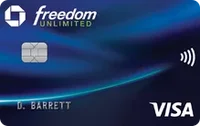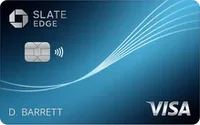Chase Slate Edge vs. Chase Freedom Unlimited

Key takeaways
- The Chase Slate Edge℠ and Chase Freedom Unlimited® are two popular Chase credit cards geared toward consumers with good or excellent credit.
- The Chase Freedom Unlimited offers cash back rewards and a shorter introductory APR offer, while the Chase Slate Edge skips rewards in favor of a longer intro APR offer.
- The right card for you depends on your goals and what you prefer having the most — more time to pay down debt with zero interest or cash back rewards.
The Chase Slate Edge℠* and Chase Freedom Unlimited® have some overlapping features, yet each card was designed to help consumers reach a different goal. Where the Chase Slate Edge is geared toward people who need to consolidate and pay down debt, the Chase Freedom Unlimited works for people who want to earn rewards while enjoying an introductory APR for a shorter time.
But which card is best for you? Ultimately, that depends on what you’re trying to accomplish when you sign up. Below we compare these two Chase credit cards based on their features and rewards to help you find the right fit.
Main details
| Chase Slate Edge | Chase Freedom Unlimited | |
|---|---|---|
| Annual fee | $0 | $0 |
| Sign-up bonus | None | Earn an extra 1.5% on everything you buy (on up to $20,000 spent in the first year) — worth up to $300 cash back. That’s 6.5% on travel purchased through Chase Travel, 4.5% on dining and drugstores and 3% on all other purchases. |
| Rewards rate | None |
|
| Introductory APR offer | 0% intro APR for the first 18 months from account opening on purchases and balance transfers (after that, a 20.49% – 29.24% variable APR applies) | 0% intro APR for the first 15 months from account opening on purchases and balance transfers (after that, a 20.49% – 29.24% variable APR applies) |
| Balance transfer fee | Intro balance transfer fee of 3% ($5 minimum) for the first 60 days from account opening (then 5% with a $5 minimum) | Intro balance transfer fee of 3% ($5 minimum) for the first 60 days from account opening (then 5% with a $5 minimum) |
Chase Slate Edge vs. Chase Freedom Unlimited highlights
To pick the right card from the Chase Slate Edge or the Chase Freedom Unlimited, it helps to know how they stack up in the most important categories. Here’s a rundown of how these credit cards compare in terms of their rewards rates, intro APR offers and fees.

Chase Freedom Unlimited
Why it won
Because the Chase Freedom Unlimited is the only one of these cards that offers rewards for spending, its welcome bonus is the clear winner in this category. This bonus is easy to earn because there’s no minimum spending threshold to hit — you simply earn an extra 1.5 percent on everything you buy on up to $20,000 spent in the first year (worth up to $300 cash back).
Also, remember that the welcome bonus on this card is offered in addition to cash back earned for each purchase you make. That becomes 6.5 percent on travel purchased through Chase TravelSM, 4.5 percent on dining and drugstores and 3 percent on all other purchases.
On the other hand, the Chase Slate Edge comes with a possible credit line increase after making on-time payments and spending at least $500 on during the first 6 months. Chase promotes this as a “welcome offer,” but it doesn’t provide as much value as traditional welcome offers do.

Chase Freedom Unlimited
Why it won
The Chase Freedom Unlimited comes with a really generous rewards rate that can work well for consumers who want a credit card for everyday spending and bills. This card offers:
- 5 percent cash back on Lyft rides (through September 30, 2027) and on travel booked through Chase TravelSM
- 3 percent back on dining and drugstore purchases
- 1.5 percent cash back on everything else
By contrast, the Chase Slate Edge doesn’t offer any rewards at all.

Chase Slate Edge
Why it won
The intro APR offer category is where the Chase Slate Edge really shines since this card gives you 18 months with 0 percent intro APR on purchases and balance transfers, followed by a variable APR of 20.49 percent to 29.24 percent. This offer is three months longer than the offer on the Chase Freedom Unlimited, which only gives you 0 percent intro APR on purchases and balance transfers for 15 months, followed by the same variable APR range of 20.49 percent to 29.24 percent.
Both cards also have the same intro balance transfer fee of 3 percent with a $5 minimum for the first 60 days from account opening, after which it rises to 5 with a $5 minimum.
How much of a difference can this make? If you have considerable debt at high interest rates to consolidate, having an additional 90 days with zero interest could easily save you hundreds of dollars in interest payments or more.
Having 18 months with zero interest instead of 15 could also help you enjoy more affordable monthly payments as you work toward becoming debt-free. If you need to pay off $5,000 in credit card debt, for example, paying it off in 15 months with a 3 percent balance transfer fee would require a $344 monthly payment, whereas paying for 18 months with a 3 percent balance transfer fee would let you pay just $287 per month.

Chase Freedom Unlimited & Chase Slate Edge
Why they won
If you’re picking a card based on fees alone, you should know that both of these cards have the same fee structure. There are no annual fees to worry about with either one, though both of these cards charge a 3 percent foreign transaction fee if you use them for purchases abroad.
As stated above, both cards also have the same balance transfer fee structure, which is 3 percent with a $5 minimum for balances transferred in the first 60 days and 5 percent with a $5 minimum after that point.
Which card earns the most?
Since the Chase Slate Edge doesn’t offer cash back for spending, the Chase Freedom Unlimited would earn more in rewards by default. If you’re willing to give up the additional three months of the introductory APR period that you would get with the Chase Slate Edge, then you’d be able to earn rewards with the Chase Freedom Unlimited.
Chase Slate Edge vs. Chase Freedom Unlimited Spending Example
Depending on your situation and how you plan to use your card, these rewards may or may not be worth it. Consider this example:
Let’s say you currently spend the following:
- $1,000 per month on gas, groceries and miscellaneous purchases
- $500 per month on dining out (including takeout and delivery)
In this scenario, you would earn $30 in rewards per month — $15 in rewards on gas, groceries and other spending at the card’s 1.5 percent rate, and $15 in rewards on dining out at the 3 percent rate. This adds up to $360 in rewards per year. Because the welcome bonus gives you an extra 1.5 percent on all purchases, you’d also earn an extra $270 on the $18,000 you spend in the year, bringing your total to $630.
Keeping in mind that the Chase Slate Edge doesn’t earn rewards, is earning $630 during the first year enough to get you to give up an additional three months with an introductory APR? Only you can decide, but it is worth noting that it’s considerably more difficult to pay down debt when you’re also using a credit card for spending. If what you really need to do is get out of debt, and you want to avoid the temptation to spend more to earn rewards, you may be better off picking the Chase Slate Edge.
Why should you get the Chase Slate Edge?
If you’re considering the Chase Slate Edge, you’ll want to know about the card’s additional benefits and the recommended credit score you’ll need to be approved.
Additional benefits
Along with being an excellent balance transfer card, the Chase Slate Edge also helps you get a lower interest rate by 2 percent each year when you pay your bill on time and spend at least $1,000 on purchases by each card anniversary. This rate drop can happen every year you’re eligible until your interest rate reaches the prime rate plus 9.74 percent.
Other benefits include purchase protection against damage or theft, extended warranties, secondary auto rental coverage and roadside dispatch. Partner benefits include three complimentary months of DoorDash DashPass membership (enrollment required by December 31, 2024), although you’ll have to enroll and then cancel the subscription before the three months are up to avoid being automatically billed for each service.
Redemption options
Because the Chase Slate Edge doesn’t offer any rewards, it doesn’t have any redemption options to compare.
Recommended credit score
This card is for individuals with good to excellent credit, which includes FICO scores of 670 and higher.
Why should you get the Chase Freedom Unlimited?
The Chase Freedom Unlimited is often considered one of the top cash back cards on the market, but the card’s intro APR offer makes it a good option for paying down debt and large purchases, too.
Additional benefits
The Chase Freedom Unlimited comes with several consumer protections built in, including purchase protection against damage or theft, extended warranties, trip cancellation and interruption insurance (worth up to $1,500 per person and $6,000 per covered trip), secondary auto rental coverage and travel and emergency assistance services.
You can also enroll to receive three months of DoorDash DashPass membership when you enroll prior to December 31, 2024. As with the Chase Slate Edge, you must cancel the subscription within three months to avoid automatic billing after the promotional offer ends.
Redemption options
This card offers cash back that can be redeemed for statement credits, gift cards, merchandise, experiences, travel through the Chase Ultimate Rewards portal and more.
Even better, you can combine this card with other Chase cards to get even more value from your rewards. For example, you can use the Chase Sapphire Reserve® to earn 10X points on hotel stays booked through Chase Travel while still earning 1.5 percent cash back on other purchases using your Freedom Unlimited card. You can then pool all of your rewards in your Sapphire Reserve account, where they are worth 1.5 cents per point (instead of the standard 1 cent per point).
Recommended credit score
This card is for individuals with good to excellent credit, which includes FICO scores of 670 or higher.
The bottom line
Reading our Chase Freedom Unlimited review and Chase Slate Edge review can help you find out more about both of these cards and how they can benefit you. You will also want to think long and hard about whether you want a longer timeline with zero interest on purchases and balance transfers or if you prefer to earn cash back for each dollar you spend.
That said, the fact credit card interest rates are so high right now may mean you’re better off forgoing rewards and working on debt repayment instead. You can always pick up a new rewards credit card later on when you become debt-free, and your debt will only continue to linger until you’re able to do something about it.
*Information about the Chase Slate Edge℠ has been collected independently by Bankrate. The card details have not been reviewed or approved by the issuer.







